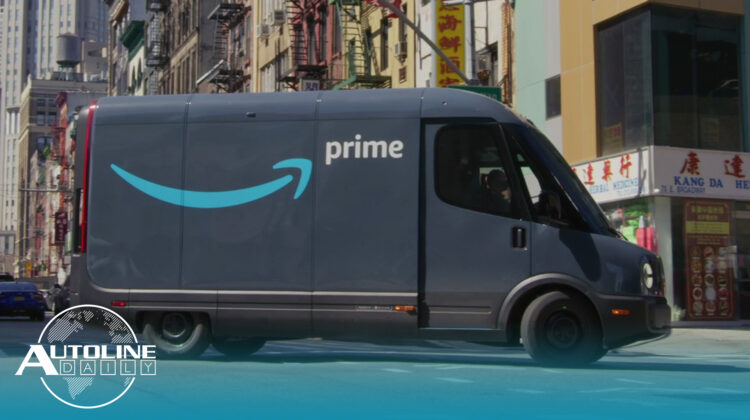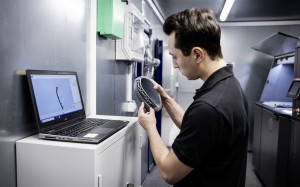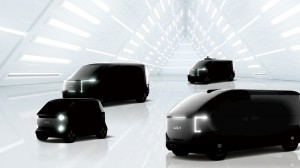
Listen to “AD #3327 – Seat Dispute Puts Amazon Vans in Jeopardy; Daimler Allows Shops to 3D Print Spare Parts; VW EV Prices Jump” on Spreaker.
Follow us on social media:
Runtime: 11:56
0:07 Rivian’s Amazon Vans in Jeopardy
1:24 Argo AI Starts Driverless AV Tests
2:05 Hydrovolt Opens Europe’s Largest Battery Recycling Center
3:01 Bluetooth Car Connection is Pathway for Hackers
4:44 Daimler Truck Allows Shops to 3D Print Spare Parts
5:42 Mercedes Taps Sila for More Energy Dense Battery
6:33 VW EV Prices Shoot Up in 7 Months
7:59 SUVs Perform Better in New Side Impact Test
8:42 Traffic Deaths Make Biggest Jump Ever
9:26 Bentley Developing Wicked Fast EV
10:38 Kia Building PBV Plant in South Korea
Visit our sponsors to thank them for their support of Autoline Daily: Bridgestone, Intrepid Control Systems, MEDC and Schaeffler.
This is Autoline Daily, the show dedicated to enthusiasts of the global automotive industry.
SEAT DISPUTE PUTS AMAZON VANS IN JEOPARDY
Rivian is going through production hell and it’s looking really serious. Now it’s in a legal dispute with its seat supplier, and that could stop deliveries of its electric vans for Amazon. The Wall Street Journal reports Rivian is suing seat supplier Commercial Vehicle Group, which is based in Ohio, accusing it of violating their contract by doubling the initial agreed upon price for the seats. Commercial Vehicle denies the claims and says it raised the price after Rivian submitted multiple engineering and design changes. Rivian says there isn’t an alternative supplier because the seats are custom designed and it could take a year to find another supplier. If Commercial Vehicle stops delivering the seats, Rivian will have to immediately stop producing the Amazon van. But a judge issued a temporary emergency order that requires the supplier to continue delivering the seats at the initial agreed upon price while the issue is being litigated. The two companies are in discussions to resolve the dispute and no doubt they will. Rivian can’t afford not to make the vans.
ARGO AI STARTS DRIVERLESS AV TESTS
Autonomous vehicles may be hitting the streets later than we thought they would, but now it’s starting to happen. Argo AI, the startup which is backed by Ford and Volkswagen, started conducting driverless test rides in Miami and Austin. Right now it’s only open to Argo AI employees, which involve Ford Escape Hybrids and VW ID. Buzz vans. In addition to ride-hailing, Argo is also developing the technology for delivery and logistics companies to integrate AVs into their fleet. The next step is to start commercial applications but Argo did not say when that will happen.
HYDROVOLT OPENS EUROPE’S LARGEST BATTERY RECYCLING CENTER
Recycling for EV batteries continues to make progress. Hydrovolt, a joint venture between Swedish battery maker Northvolt and the energy company Hydro, announced it’s started commercial EV battery recycling operations at its plant in Norway. It claims it’s the largest EV battery recycling center in Europe, with the capacity to process 12,000 tons of battery packs a year, the equivalent of 25,000 EV batteries. Hydrovolt says it can recycle up to 95% of the battery. Northvolt will use some of that recycled material to produce new batteries and Hydro will reuse the recycled aluminum for use in commercial grade products. Hydrovolt is looking into opening more recycling plants in Europe and is aiming to recycle 300,000 tons of battery packs by 2030.
BLUETOOTH CAR CONNECTION IS PATHWAY FOR HACKERS
You know how some automakers allow you to unlock your car or start the engine using your smart phone and a Bluetooth connection? It’s kind of cool, but it’s also an easy way for thieves to steal your car. The NCC Group, which is a cybersecurity company in the UK, says hackers just need about $100 in hardware and $50 in software to break into any car with a Bluetooth keyless entry system. NCC showed Bloomberg how it was easily able to break into a Tesla Model S and Model Y and start them up. A hacker just has to place a relay within 15 yards of a smartphone, and one near the car. If your car is parked on the street or driveway and your phone is in your house, that’s close enough in most cases. The hack cannot be fixed with an over the air update. It needs a hardware change.
DAIMLER ALLOWS SHOPS TO 3D PRINT SPARE PARTS
3D printing just took a giant step forward as Daimler Truck announced it’s going to allow fleet owners with printing machines to make their own spare parts. The fleets need to get a certified 3D printer, go through a one-time registration process, and apply for a license to print the required part in the desired quantity. But fleets only get to use that license one time. After they print the parts they applied for, the license expires without the data being saved. Even so, fleets will probably leap at the opportunity. No more ordering parts from a distributor and waiting for them to show up. They can print out what they need and get their trucks back on the road as fast as possible. Starting next month, fleets will be able to print 100 different parts, but they’ll soon have a digital catalog of 1,500 parts, and Daimler Truck plans to add even more.
MERCEDES TAPS SILA FOR MORE ENERGY DENSE BATTERIES
Mercedes-Benz is claiming something of a battery breakthrough using silicon anode chemistry from a Silicon Valley company called Sila. Whereas some of the best lithium-ion batteries today have an energy density of around 670 watt hours per liter, the battery Mercedes will use has an energy density of more than 800 watt hours per liter. That will provide greater driving range, or even the opportunity to use fewer batteries, keep the same range, but reduce cost. The batteries will be used in the electric version of the G-wagon, which will be out sometime in the next three years or so. The anodes will be manufactured using 100% renewable energy at a plant Sila is building in the state of Washington.
VW EV PRICES SHOOT UP IN JUST 7 MONTHS
VW is starting to take orders for the ID. Buzz and ID. Buzz Cargo in most European markets this Friday, May 20th. But we were a little shocked at the price. The Cargo starts at 54,400 euros in Germany, while the 5-seat version starts at 64,500 euros. But just 7 months ago, in November of last year, the ID.5 Pro Performance, which is built on the same platform and has the same motor and battery pack as the ID. Buzz, went on sale in Germany with a price of 47,500 euros. That’s a 6,900 price difference and probably reflects the raw materials increases, as well as Volkswagen trying to get more profit margin.
SUVs PERFORM BETTER IN NEW SIDE IMPACT TEST
The Insurance Institute for Highway Safety or IIHS recently made its side impact test much tougher. The simulation produces 82% more energy compared to the old test, by testing them at 37 miles an hour instead of 31. And when the first batch of 20 small SUVs went through the new test last October only one earned a good rating. But now that automakers have had time to adjust, they’re performing much better. In a second round of tests 10 out of 18 mid-size SUVs earned a good rating on the new side impact test and not one got a poor score.
TRAFFIC DEATHS MAKE BIGGEST JUMP EVER
Despite making cars stronger and adding all kinds of safety equipment, traffic deaths continue to rise in the U.S. and last year is likely to be a record breaker. The National Highway Traffic Safety Administration or NHTSA estimates there were nearly 43,000 traffic fatalities in 2021, which would represent an increase of 10.5%. That would be the highest jump in a single year since they began recording this stuff in 1975. NHTSA says the main culprits are a decline in seatbelt use and people spending more time on the road, but alcohol- and speed-related deaths also saw increases.
BENTLEY DEVELOPING WICKED FAST EV
And we’ve seen a number of people in the comments section question whether some of these wickedly fast vehicles that are coming out into the hands of novices is also playing a role in the increase of reckless driving. And Bentley’s first electric vehicle could fit in that category. CEO Adrian Hallmark says its EV will have over 1,000 kW or up to 1,400 horsepower and be able to do 0-60 in as little as 1.5 seconds. We’ve heard of people complaining of headaches or feeling nauseous after several hard accelerations in a really fast car. But you might just need a soup ladle to scoop up your brain after flooring the Bentley. The CEO did acknowledge this and said a 2.7 second 0-60 would be offered for those that want something slower. Hallmark added it will cost more than 250,000 euros or over $263,000, that it will not be a sedan and should go into production in 2025.
KIA PLANS PURPOSE BUILT FACTORY FOR PURPOSE BUILT VEHICLES
They look like those autonomous vehicles from Canoo, but they’re not. These are from Kia, and it calls them PBVs, or purpose built vehicles. That’s kind of a catch-all phrase for robo taxis and autonomous delivery vans. It’s going to start building them at a plant in South Korea in 2025, with an initial capacity of 100,000 a year, but with the capability to take that to 150,000. Kia’s goal is to become a global leader in the PBV market which is going to put it in direct competition with Hyundai, which also wants to play a big role in the market for these kinds of vehicles. So, it will be interesting to see how they differentiate themselves.
And that brings us to the end of today’s show. Thanks for tuning in.
Thanks to our partner for embedding Autoline Daily on its website: WardsAuto.com
Seamus and Sean McElroy cover the latest news in the automotive industry for Autoline Daily.








